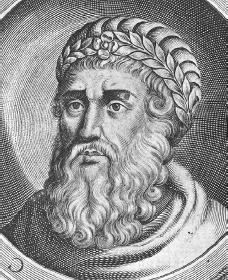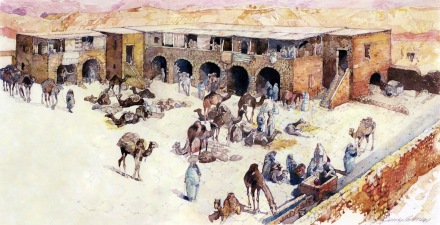
King Herod the Great
It was I who found out first. I was summoned to his audience chamber to discover him pacing up and down.
‘You have to go’ he said ‘And kill him’.
In his present mood I didn’t dare ask any questions, so I waited. He paced up and down a bit more, and then turned around and saw me still waiting there.
‘What are you doing still waiting there?’
‘I am waiting for you to tell me who I am going to kill, and where’
‘That baby in Bethlehem, of course.’ he raged ‘Just go and do it’.
‘How am I to know which baby in Bethlehem I am supposed to kill?’
‘Use your initiative. If they don’t tell you which baby it is – kill them all’
‘Kill them all? All of the babies in the whole town?’
‘Yes. Well, at least all the boys. Its going to be a boy of course’. I bowed myself out of the room, and went to gather my centuria to march to Bethlehem to carry out King Herod’s orders.
I remember the journeys there and back so clearly. On the way I was trying to work out how on earth I was going to work out which baby was the one born to be king. When we got there, I stopped outside the town and briefed my soldiers. There was silence when they were told that we had come to kill a baby, but not much surprise. They knew King Herod and his moods only too well. There was shock on their faces as I told them that if the town didn’t give up the baby, we were to kill all the baby boys in the town aged under two years old, that being the time that the Arabians had said that the star had appeared.
We marched in to town in good order, and into the market place. I sent some of my soldiers to gather the people of the town in the market place. When they were gathered and stood in front of me, I told them that King Herod had been told that a baby had been born in Bethlehem, who was prophesied to be a king. We had been sent to find him. I waited and watched the crowd. Most of the crowd looked bewildered, but a few looked as if they might know what I was talking about. I picked on one and asked them directly where the baby was, when they didn’t answer, I picked up a nearby child and held my sword to its throat, and demanded that they tell me where the baby was, otherwise I would kill this child. At this point several women began to scream, and run away. I motioned to my men, who went and drove them back in to the crowd.
Several voices began to shout at me in panic, that the family I was looking for had left weeks ago. I ordered the crowd to be silent and asked one of the speakers to tell me what they knew. They told me that a baby had been born to a family who had come for the census. Shepherds had come to visit them in the middle of the night because, so they said, angels had told them he was God’s son. Then some men from Arabia had come to present him gifts. This sounded very promising. So I asked the crod which one of them was this family. Several people told me, and everyone assured me that the family were long gone, but I didn’t believe them. I kept on at the gathered crowd for hours, until people began to faint, and children cried out for food and drink, but still no one would tell me where the baby was, or where the family had gone.
At last I lost my patience, and told them that if they didn’t reveal which of the babies in the crowd was the one I was looking for, I would have to kill every baby boy in the town. For an instant there was stunned silence, and then the anger of the crowd, long confined, rose up. I ordered some of the my men to keep the crowd under control, and others to pick out every boy child under the age of two, and kill them. Others I ordered to check all the houses to make sure there was no baby boy hidden in them.
As the first child was killed a great wailing rose up from the crowd, and some of the younger men began to surge forward, fists raised. I didn’t want any more blood on my hands than necessary so I ordered my men to beat them back with the flats of their blades. Still no one would say where the baby born to be king was. I began to believe that the family might have left, but I couldn’t return to King Herod unless I was reasonably certain that the baby was dead. So I did as I had been ordered by King Herod and killed every one of the 20 boy children we found. We regrouped and marched away, leaving the town covered in the blood of its children and young men.
The journey back was made in silence while we all contemplated the horror of what we had done. Many of my men have children of their own; I have children. We had killed women and children before, but it was always in the context of a war, a battle, a rebellion, and if they were not actually combatants, they were complicit by association. To go to a town living in peace, to find and kill a baby who might just one day become a king to challenge an already ill and aging tyrant, was completely against my principles. To be forced to kill every baby because the one could not be found, revolted me and my men. But we didn’t feel we had a choice. If we had failed in our task, with the mood the King was in at that moment he would most likely have killed me himself. He was certainly capable of that. He would then have had my men executed for disobeying orders. Then he himself would most probably have led another unit of soldiers to Bethlehem, and would have killed more than just the babies in the town. Obeying orders is sometimes easy because what you are asked to do is something you want to do, obeying orders you know are wrong, is difficult. I made a judgment that not to have obeyed orders would have brought more bloodshed on more people, and I have to live with that for the rest of my life. But it has not lessened the horror of what I had to do.
King Herod died only a few years after this terrible event, mourned outwardly by his troops, who formed his funeral procession, and in sullen silence by the citizenry forced to watch the magnificent funeral. I completed my years of service and took retirement. I married the Judean woman who was the mother of my children. We had not been legally allowed to marry while I was still in the army. We used my retirement money to buy some land from a kinsman of hers in her home town, and I settled down to the life of a farmer. The events in Bethlehem scarred me more than I ever thought that they would. I still wake at night sometimes, hearing the crying of the babies and the wails of their mothers. Soon after the event a couple of my men deserted, and had to be brought back and flogged, before being dishonourably discharged. I handed out the lightest sentence that I could, but I had to maintain discipline.
When the nightmares keep me awake at night, I ask myself if I could have done anything differently. Most of the time I don’t think I could, but it doesn’t stop me from regretting what I had to do. I also wonder whether one of the boys was the one I should have killed, or whether sometime a man will come forward and claim to be the king visited by the Arabians, and prophesied by them to be the king to save Judea.

